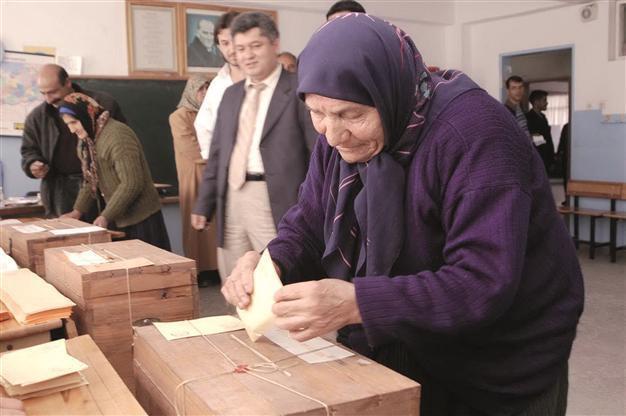Turkey’s presidential election caught on OSCE radar
ANKARA

Turkish local elections were rerun in 14 locations over the weekend due to corruption claims. DHA photo
Irregularities and controversies that forced authorities to cancel some of the March 30 local election results in Turkey have moved Europe’s security body to announce that a mission will observe Turkey’s upcoming first direct presidential election.
The Office for Democratic Institutions and Human Rights (ODIHR) of the Organization for Security and Co-operation in Europe (OSCE) undertook a Needs Assessment Mission (NAM) to Turkey between May 7 and 9 upon an official invitation from the Turkish authorities to observe the presidential election which will be held in two rounds in August.
“The majority of OSCE/ODIHR NAM interlocutors expressed a certain level of confidence in the electoral process and referenced the country’s long-standing tradition of democratic practices,” said a report, drafted after this mission and dated June 3, in its “Conclusions and Recommendations” section.
“However, they also raised particular concern with the new legal framework and its possible gaps and shortcomings and noted a recent weakening of general public confidence in the authorities, particularly following the recent local elections,” added the report.
“Some previous OSCE/ODIHR recommendations remain unaddressed and most OSCE/ODIHR NAM interlocutors stated that they would welcome an OSCE/ODIHR observation activity for the upcoming election, with some having emphasized the necessity of the OSCE/ODIHR’s longer-term presence. A number of aspects could merit attention by an OSCE/ODIHR election observation activity, including the new legal framework; campaign finance provisions; the conduct of the electoral campaign; and the work of the media,” it said.
Turkish officials in Ankara played down the significance of the conclusions of the report.
“This will not be the first time that a team from the OSCE will observe elections in Turkey,” a senior Foreign Ministry official, speaking under customary condition of anonymity, told the Hürriyet Daily News yesterday. “Turkey has a democratic tradition which is older than half-century. In the end, the observation of elections will display the maturity of democracy in Turkey, so this is favorable.”
Delicate wordingThe OSCE report was apparently delicately tailored, so as to avoid angering the government of Turkey, which has been a member of the 57-member body since its very inception in 1975, when it was formed as a standing conference.
Still, possible issues that could ultimately lead to flaws in regards to election results were delicately noted in the report.
“The campaign period commences on the day the candidate list is finalized on July 11. An active and possibly tense campaign is expected, which will likely continue to focus on national issues raised during the recent local elections such as recent anti-government protests and alleged corruption involving state officials. OSCE/ODIHR NAM interlocutors did not raise concerns as to the ability of candidates to campaign freely, although some noted possible intimidation of voters and the potential misuse of administrative resources by the governing party,” said the report, which is an outcome of the mission aimed at assessing the pre-election environment and preparations for the presidential election.
The report, meanwhile, made a point of offering thanks to the Turkish Foreign Ministry “for its assistance and cooperation in organizing the NAM,” as well as to its interlocutors.
A hot August for allThe stakes are growing with deepening tension and polarization in the country in the run-up to the August vote.
Although not having yet officially declared his candidacy, Prime Minister Recep Tayyip Erdoğan is widely expected to run in August, and the results of municipal polls on March 30, when the AKP won 43 percent of the national vote, suggest a majority in the first round could be within his reach.
The president of the Republic of Turkey will be elected with an absolute majority of valid votes. If no candidate receives the majority of the votes in the first round scheduled for Aug. 10, a second round of voting will take place on Aug. 24 between the two candidates receiving the most votes in the first round.
In partial reruns of the March 30 local polls, the ruling Justice and Development Party (AKP) lost out in two provinces on June 1, but won in five of 13 district municipalities.
